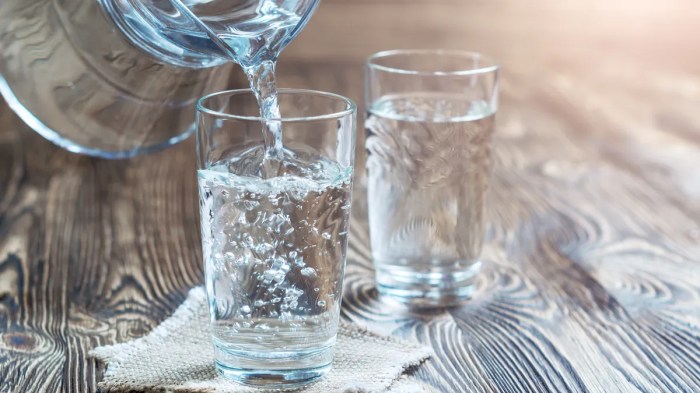
Hydration and health go hand in hand, playing a crucial role in how our bodies function day to day. From enhancing physical performance to supporting mental clarity, staying properly hydrated is essential for overall well-being. It is fascinating how something as simple as water can significantly impact various aspects of our health.
This can be seen in how hydration influences not only our physical capabilities but also our mental functions, while contributing to a balanced diet and addressing specific health concerns. Whether it’s choosing the right hydrating foods or understanding its role in managing weight, hydration is a vital topic worth exploring.
Hydration and its Effects on Health

Maintaining proper hydration is crucial for overall health and well-being. Water plays a fundamental role in various physiological processes, including temperature regulation, nutrient transport, and waste elimination. Despite its importance, many individuals overlook hydration in their daily routines, leading to complications both physically and mentally. Understanding the effects of hydration can empower individuals to make better choices for their health.Hydration is essential for the body to function optimally.
Approximately 60% of the human body is composed of water, and it is involved in nearly every bodily function. Adequate hydration helps to regulate body temperature, lubricate joints, and facilitate digestion. Water also plays a key role in cellular processes, such as nutrient absorption and metabolic reactions. When the body is dehydrated, even mild deficits can lead to impaired physiological functions, affecting everything from skin health to organ performance.
Impact on Mental Health and Cognitive Performance
Hydration significantly influences mental health and cognitive functions. Research has shown that even mild dehydration can lead to difficulties in concentration, increased fatigue, and mood fluctuations. Staying adequately hydrated is vital for maintaining optimal brain function, as water is necessary for the brain’s overall structure and communication between neurons. Studies indicate that hydration levels can affect cognitive tasks such as memory recall, attention span, and reaction time.
For instance:
- In one study, participants who were mildly dehydrated demonstrated a noticeable decline in cognitive performance compared to those who were well-hydrated.
- Another study found that hydration status could impact mood, with dehydrated individuals reporting increased feelings of anxiety and tension.
Therefore, adequate fluid intake is crucial for cognitive performance, especially during tasks requiring sustained attention and mental clarity.
Effects on Physical Fitness and Athletic Performance
Hydration is equally important for physical fitness and athletic performance. Water is essential for maintaining blood volume, regulating body temperature, and ensuring efficient muscle function. Dehydration can lead to decreased endurance, increased perceived exertion, and a higher risk of heat-related illnesses during exercise.Proper hydration strategies can enhance athletic performance through several mechanisms:
- Hydration helps maintain optimal body temperature, crucial for endurance athletes, especially in hot environments.
- Well-hydrated individuals experience improved strength and power output, allowing for better performance in high-intensity workouts.
- Fluid intake before, during, and after exercise aids in recovery, reducing muscle soreness and speeding up the healing process.
For example, athletes often utilize electrolyte drinks to replenish lost fluids and minerals during intense training sessions or competitions. The effectiveness of these beverages highlights the need for hydration to support peak performance.
“Water is the essence of life, and staying hydrated is essential for achieving optimal health and performance.”
Hydration in Relation to Nutrition

Hydration plays a crucial role in a balanced diet, serving as a fundamental component for maintaining overall health. Proper hydration not only supports physical performance but also enhances nutrient absorption, digestion, and metabolic functions. Understanding how hydration interacts with nutrition can help individuals make informed choices that contribute to their well-being.The hydrating properties of fruits and vegetables are essential for replenishing fluids in the body while also providing vital nutrients.
Many of these foods are high in water content and can significantly contribute to daily hydration needs. Below is a comparison of some common hydrating fruits and vegetables, along with their nutritional benefits.
Fruits and Vegetables with High Hydration Properties
Fruits and vegetables are excellent sources of hydration, as they contain varying levels of water and essential nutrients. Here are some notable examples:
- Watermelon: Composed of about 92% water, watermelon is not only refreshing but also packed with vitamins A and C. It’s a great choice for hydration during hot weather.
- Cucumbers: With around 95% water content, cucumbers are particularly low in calories and provide a good source of vitamin K. They can be added to salads or eaten as snacks.
- Strawberries: These berries are approximately 91% water and are rich in antioxidants, fiber, and vitamin C, making them a delicious and hydrating option.
- Celery: Celery contains about 95% water and is an excellent source of dietary fiber, vitamin K, and potassium, contributing to hydration and overall health.
- Spinach: With about 91% water, spinach is nutrient-dense, providing iron, calcium, and vitamins A, C, and K, making it a vital addition to various dishes.
Choosing the right beverages can also enhance hydration levels significantly. Certain drinks not only provide fluids but can also have positive effects on overall health. Here are some of the best beverages for optimal hydration.
Best Beverages for Optimal Hydration
It’s important to select beverages that not only hydrate but also deliver health benefits. Below are some of the best options:
- Water: The most straightforward and effective way to stay hydrated. Drinking water before, during, and after physical activity is essential for maintaining fluid balance.
- Coconut Water: Known for its natural electrolytes, coconut water is a great alternative to sugary sports drinks, providing hydration along with potassium and magnesium.
- Herbal Teas: Naturally caffeine-free options such as chamomile or peppermint tea can be hydrating and soothing, contributing to daily fluid intake.
- Vegetable Juice: Low-sodium vegetable juice can provide hydration while supplying essential vitamins and minerals, making it a nutritious choice.
- Infused Water: Adding fruits like lemon, berries, or herbs to water can enhance flavor and make hydration more enjoyable, encouraging increased fluid intake.
Incorporating hydrating foods and beverages into your daily routine is not only beneficial for hydration but also supports overall health and nutrition. By being mindful of your hydration choices, you can optimize your health and wellness effectively.
Hydration and Specific Health Concerns
Hydration plays a crucial role in maintaining overall health and can directly influence various specific health concerns. Understanding the relationship between hydration and conditions such as kidney health, urinary tract infections, obesity, and age-related hydration needs is essential for fostering better health outcomes across different demographics.
Hydration and Kidney Health
Proper hydration is vital for kidney function, as the kidneys filter waste and excess substances from the blood. When dehydrated, the kidneys may struggle to perform their functions effectively, which can lead to kidney stones and other complications. It is important to note the following:
- Water helps to dilute the concentration of minerals and salts in urine, reducing the risk of kidney stones.
- Hydration promotes optimal blood flow to the kidneys, facilitating efficient waste elimination.
- Insufficient water intake can lead to urinary tract infections (UTIs), as concentrated urine can irritate the bladder and urinary tract.
Staying well-hydrated is a simple yet effective way to support kidney health and reduce the risk of urinary tract infections.
Hydration in Weight Management
Hydration plays a significant role in weight loss and managing obesity. Drinking adequate water can aid in appetite regulation and metabolic processes. Consider the following points:
- Drinking water before meals can create a feeling of fullness, leading to reduced caloric intake.
- Hydration can boost metabolism; studies show that drinking cold water may increase the number of calories burned as the body warms it to body temperature.
- Sometimes, thirst can be mistaken for hunger, leading to unnecessary snacking and increased calorie consumption.
Incorporating proper hydration into daily routines is a practical strategy for effective weight management.
Hydration in Child Health and Elderly Care
Hydration needs vary significantly between children and the elderly due to differences in body composition and activity levels. Understanding these differences is critical for promoting health.
- Children are more susceptible to dehydration because of their smaller body size and higher metabolic rates, making regular fluid intake essential throughout the day.
- Older adults often experience a decreased sense of thirst, making it important for caregivers to encourage fluid consumption to prevent dehydration.
- Both groups require specific attention to hydration during extreme weather conditions, as heat can amplify fluid loss through sweat.
Monitoring hydration closely during childhood and old age is pivotal for preventing health complications related to dehydration.
Closing Notes
In summary, understanding hydration and health is vital for maintaining a balanced lifestyle. By prioritizing proper hydration, we can enhance our physical performance, mental health, and overall well-being. As we continue to discover the connections between hydration and various health aspects, it becomes clear that staying hydrated is not just a choice but a necessity.
FAQ Insights
How much water should I drink daily?
It’s generally recommended to drink about 8 glasses or 2 liters of water a day, though individual needs may vary based on activity level and climate.
Can I hydrate with beverages other than water?
Yes, beverages like herbal teas, coconut water, and certain fruits or vegetables can contribute to hydration.
Does hydration affect skin health?
Absolutely! Proper hydration helps maintain skin elasticity and can improve its overall appearance.
Is it possible to overhydrate?
Yes, overhydration can lead to a condition called hyponatremia, where sodium levels in the blood become dangerously low.
What are the best fruits and vegetables for hydration?
Watermelon, cucumbers, oranges, and strawberries are among the best options due to their high water content.





